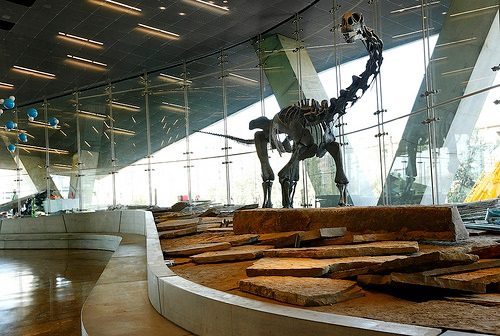
June 16, 2014; Scientific American and Dallas Morning News
Staff science writer for the Dallas Morning News Anna Kuchment noticed something off about an exhibit at the Perot Museum of Nature and Science concerning global warming and climate change. Upon investigation, it turns out that one of the panels, which discussed the causes of climate change, including manmade influences like carbon emissions, had been omitted—lost in the shuffle—since the exhibit’s installation in December of 2012.
Sign up for our free newsletters
Subscribe to NPQ's newsletters to have our top stories delivered directly to your inbox.
By signing up, you agree to our privacy policy and terms of use, and to receive messages from NPQ and our partners.
This caused Kuchment to become suspicious, given some deep connections between the museum and the Texas oil industry, which has some investment in downplaying the connection between the use of fossil fuels and the rise in global temperatures. ExxonMobil has given more than a million dollars, and the earth sciences hall where the panel was slated to hang was named for the Rees-Jones Foundation, started by Chief Oil & Gas founder, president, and CEO Trevor Rees-Jones and his wife, Jan, which has donated more than $25 million.
Steve Hinkley, vice president of programs at the Perot Museum, says he did not learn of the panel’s omission until a reporter began inquiring about it earlier this month, and has had a temporary panel installed. (The temporary panel is apparently also problematic; some scientists who’ve seen it say that it equates the influence of human activity on climate change with that of volcanic emissions, when the latest studies show that our carbon dioxide emissions are close to a hundred times greater.)
According to Hinkley, “neither the museum’s donors nor its board of directors has any say in museum content. He added that none has ever expressed opposition to the display of information about climate change.” But just because donors and the board don’t act directly doesn’t mean that the desire not to court controversy hasn’t had an effect on what exhibits say and don’t. The News Chronicle article goes on to quote several different museum workers and representatives about their experiences handling what some outside the scientific community consider sensitive topics.
- “We try to avoid saying things that are not necessary to be said,” said Carolyn Sumners, vice president for astronomy and the physical sciences at the Houston Museum of Natural Science. The museum doesn’t use the term “global warming” except in a historical context, such as the natural warming that took place during the time of the dinosaurs. Visitors are just as unlikely to find overt references to evolution. “We don’t need people to come in here and reject us,” Sumners said. The museum does have an extensive display about human origins and human ancestors — a subtle approach that one might call “just the artifacts.”
- Louise Bradshaw, director of education at the St. Louis Zoo, who has given talks about navigating politically controversial subjects, said, “Sometimes when you put the two words [global warming] together, it creates a flashpoint that gets distracting,” she said. “There are other ways to get there without picking a fight.”
- Several museums have found it helpful to post statements about climate change on their websites. The Science Museum of Minnesota’s site explains that climate change is “a fundamental element of scientific literacy and critical thinking.” The statement continues: “While the understanding of the drivers and consequences of climate change will continue to advance with additional research, the fundamental premise remains sound that human life has altered the atmosphere and is one of the causes of climate change.” The St. Louis Zoo and the Association of Zoos and Aquariums have posted similar position statements.
In the end, part of the decision to avoid these and other sensitive topics lies with trying to court a broader audience that’s more interested in flashier topics like dinosaurs and comets than in “bummer topics” like global warming. However, if the goal of science museums is to leave their attendees informed as well as entertained, then they should not shy away from giving the latest and whole truth concerning what Paul Martin, senior vice president for science learning at the Science Museum of Minnesota in St. Paul, called “about the most politically controversial topic that we can take on right now.”—Jason Schneiderman











